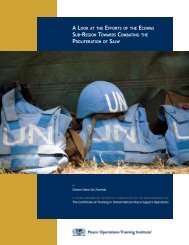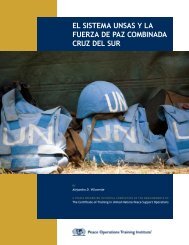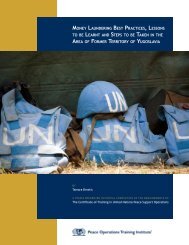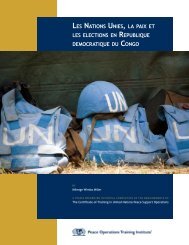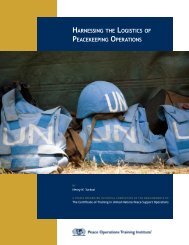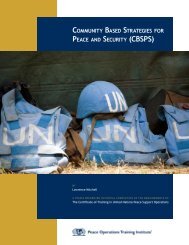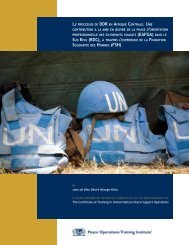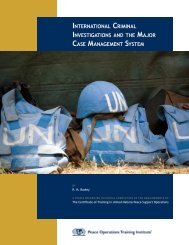COTIPSO Operating Framework (PDF) - Peace Operations Training ...
COTIPSO Operating Framework (PDF) - Peace Operations Training ...
COTIPSO Operating Framework (PDF) - Peace Operations Training ...
Create successful ePaper yourself
Turn your PDF publications into a flip-book with our unique Google optimized e-Paper software.
<strong>Operating</strong> <strong>Framework</strong> for the Certificate of <strong>Training</strong> in UnitedNations <strong>Peace</strong> Support <strong>Operations</strong> (<strong>COTIPSO</strong>)1. AUTHORITYThis <strong>Operating</strong> <strong>Framework</strong> for the cooperative programme of study leading to theCertificate of <strong>Training</strong> in United Nations <strong>Peace</strong> Support <strong>Operations</strong> (<strong>COTIPSO</strong>) is promulgatedby the <strong>Peace</strong> <strong>Operations</strong> <strong>Training</strong> Institute (POTI). It shall be the purpose of this <strong>Operating</strong><strong>Framework</strong> to establish the procedures by which POTI and authorised national peacekeepingtraining centres, universities, and other training institutions shall form a cooperative programmefor the purpose of offering standardised training in peacekeeping. This programme shall beadministered by the Executive Director of POTI.2. PURPOSE OF THE COOPERATIVE PROGRAMME OF STUDYIt is the purpose of this cooperative programme of study to offer a training structure thatintegrates classroom training, distance training, and student research in the form of an originalthesis on a topic related to peacekeeping. This cooperative programme of study is designed to beuniversally available, flexible, and economical. A student who satisfactorily completes all threecomponents of the programme will be awarded the Certificate of <strong>Training</strong> in United Nations<strong>Peace</strong> Support <strong>Operations</strong>. The holder of this certificate will have demonstrated a thorough studyof peacekeeping, but the certificate will not be offered as a guarantee of employment with theUnited Nations.3. BACKGROUNDThe training of peacekeepers has always been a national responsibility and a nationalprerogative. The United Nations Department of <strong>Peace</strong>keeping <strong>Operations</strong> (DPKO) Integrated<strong>Training</strong> Service (ITS) issues training materials and guidelines for how peacekeeping trainingshould be conducted, but DPKO ITS is not responsible for the actual conduct and delivery ofpeacekeeping training.There are hundreds of peacekeeping related courses offered by more than 80 differentnations through their national training centres. These courses range from a few days to severalmonths. The classroom instructors are usually military personnel of the nation offering thecourse. Many of the resident programmes include some sort of exam and most award a certificateor other form of recognition for completion, but this varies between programmes. In most casesthe cost of the training is borne by the nation offering the courses, and in some cases foreignstudents are permitted to attend upon payment of an enrolment fee.In addition to the resident classroom courses offered by peacekeeping training centres,there are also classroom peacekeeping courses offered by other organisations. These includetraining and educational components within the UN system, courses held at colleges anduniversities specializing in UN-related studies, and courses conducted by NGOs and private notfor-profittraining (and research) facilities.POTI offers a programme of self-paced correspondence courses on peacekeeping.Students from 165 different nations study the course materials, submit an exam at the end ofeach course, and if they pass, receive a certificate of completion for each course.Page 1




